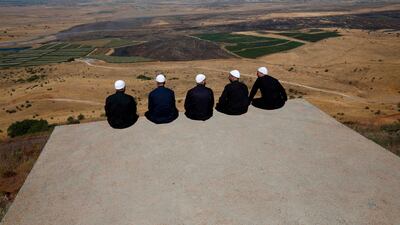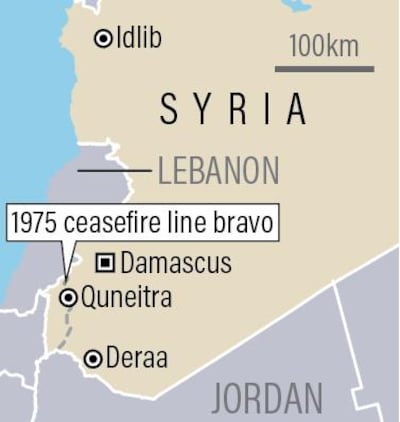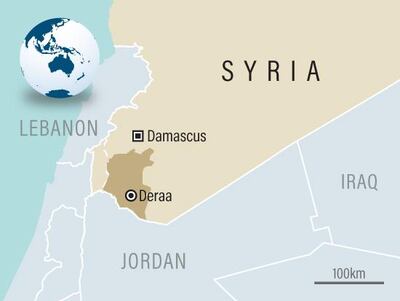Israel on Monday threatened reprisals to any attempt by Syrian forces advancing against southern rebel areas to deploy in a Golan Heights frontier zone that was demilitarised under a 44-year-old UN monitored truce.
Syrian government forces backed by Russia have launched an offensive in the southern Deraa province and are widely expected to move on rebel-held Quneitra, which is within a part of the Syrian Golan covered by the armistice.
Israel worries that Syria's President Bashar Al Assad could let its enemies Iran and Hezbollah move forces into the area, giving them a foothold near its border. Tehran and the Lebanese group both back Mr Assad.
"For our part, we will sanctify the 1974 disengagement agreement, and there too we will insist that every last letter be abided by, and any violation with meet a harsh response from the State of Israel," Defence Minister Avigdor Lieberman told his parliamentary faction.
Mr Assad's conduct in southern Syria is expected to come up in talks in Moscow on Wednesday between Israeli Prime Minister Benjamin Netanyahu and Russian President Vladimir Putin.
Russia, whose 2015 intervention in the Syrian civil war turned the tide in Mr Assad's favour, has largely turned a blind eye to repeated Israeli air strikes in Syria targeting suspected Iranian or Hezbollah emplacements and arms transfers.
But diplomats on both sides say Russia has made clear that it would oppose any Israeli action endangering Mr Assad's rule.
On Sunday night, Syria said its air defence repelled an Israeli sortie against the T4 air base in Homs province, where seven Iranian Revolutionary Guards Corps personnel died in an April 9 attack that Damascus and Tehran also blamed on Israel.
______________
Read more:
Russia to move 1,000 from de-escalation zone in southern Syria
Israel launches missile strike on airbase in Syria
______________
Meanwhile, in south Syria’s Deraa province, the Russian military was planning to move as many as 1,000 people to northern Idlib province, Interfax news agency reported on Monday, citing Russia's Centre for Reconciliation in Syria. The Syrian army and allied troops also laid siege to the holdout rebel-held enclave in Deraa and were poised to gain complete control of the city where the uprising against Mr Assad's rule first erupted, rebels said.
Between 150 and 200 Syrians displaced by the recent southern offensive were still at the border after about 60,000 began to return, UN Humanitarian Coordinator in Jordan, Anders Pedersen, told reporters on Sunday. Many of the remaining civilians have not headed home for fear of living under the Syrian regime.
Amman is relieved that most have headed home, after refusing to allow them to cross into Jordan which already hosts 650,000 Syrian refugees registered with UNHCR. But many of those who did go back say they still feel unsafe.
“When people returned from the Jordanian border to Um Al Mayathen, the closest town to the Nassib crossing, they were surprised that the army stormed the town after it was pounded by air strikes," said Adnan Maslameh, a lawyer based in Deraa who took part in early talks between rebels and the Russians.
Residents in other villages in East Deraa reported widespread looting and arson, he said.
The Assad regime has besieged rebel-held areas in the city of Deraa, where the uprising against the Syrian government began seven years ago.
“Bashar Al Assad wants a total invasion of rebel-ruled areas in south-west Syria. For the time being, and because Russia and Jordan struck a deal, he is forced to take an area by area approach to this region and strike a number of smaller deals with the various local rebel groups,” said Nicholas Heras, a Syria expert at the Washington-based Centre for a New American Security.
“But the view from Damascus is any and all of these deals struck with the rebels are temporary and are designed to keep Assad from spending too many troops in needless battles in southern Syria."
The opposition knows that President Al Assad is out to recapture rebel-held areas and therefore are reluctant to trust him. "The atmosphere in southern Syria is tense and could easily reignite into conflict,” he said.
However, the recent offensive has thrown up a major dilemma for the government in Amman. Jordan, backed by the US, UK and other western governments, have supported, trained and funded some southern rebel groups in recent years. The collapse of these groups as Mr Assad’s forces and its allies move in, poses the question of Jordan’s response.
Until last week, the Syrian side of the border was largely patrolled by a lightly armed tribal army backed by Amman. The group of about 5,000 men were deployed from the Nassib crossing in the east towards Suwaida, and even to areas near the Iraqi border. It acted as a border guard and was involved in fighting with other hardliner groups such as ISIS in the eastern desert.
It’s too early to talk about the reopening of the Nassib border crossing recaptured by the Syrian regime in recent days, as western-backed forces pull back, one Jordanian government official said on condition of anonymity.
However, as the rebels’ fortunes have been reversed, Amman has shifted its discourse towards the groups it used to support as well as towards Damascus.
Other Jordanian officials say reopening the entry point could have a positive effect on the economy and security of both countries.
The Syrian regime's control of the border area, said Khaled Massaid, Jordan's commander of the northern military region, will see the enforcement of security. And with security, he says, trade is likely to start again.
"The decision to open the border with Syria is political and if a political agreement is reached, security arrangements will follow," he said at the weekend.
"The renewed Syrian control over the border will allow for the resumption of international trade through the Nassib crossing,” said Sam Heller, a senior analyst with International Crisis Group.
“For Jordan, it will strengthen its political and economic integration into its regional surroundings. Beyond Nasib, now Jordan will also have a border whose other side is manned by a state and regular military, not a fractious set of militias.”



